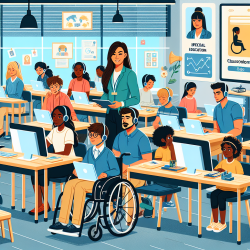Introduction
Communication is a cornerstone of human interaction, and for children with Down Syndrome (DS), it often presents a significant challenge due to speech impairments. The recent study titled "Talkitt: toward a new instrument based on artificial intelligence for augmentative and alternative communication in children with Down syndrome" explores innovative solutions to enhance communication abilities in this population. This blog aims to provide practitioners with insights on how to implement these findings to improve their practice and encourage further research in this area.
Understanding Talkitt and Its Impact
Talkitt, developed by Voiceitt, is a mobile application leveraging artificial intelligence to translate unintelligible sounds into clear speech. This tool is designed to support individuals with speech impairments, including those with DS, by improving their communication abilities. The study evaluated the usability, satisfaction, and impact of Talkitt on adaptive behavior and communication among 23 individuals with DS over a six-month period.
Key Findings
- Usability and Satisfaction: The application demonstrated good usability and high levels of satisfaction among participants and caregivers. Over 70% reported clear instructions and ease of use.
- Linguistic Improvement: Significant improvements were noted in linguistic abilities, particularly in naming, which is crucial for effective communication.
- Adaptive Behavior: The use of Talkitt showed positive effects on adaptive behavior, enhancing the overall quality of life for individuals with DS.
Implications for Practitioners
For practitioners, integrating AI-based tools like Talkitt into therapy sessions can offer substantial benefits. Here are some ways to implement these findings:
- Incorporate Talkitt in Therapy: Use Talkitt as a supplementary tool in speech therapy to enhance communication skills in children with DS.
- Monitor Progress: Regularly assess the impact of Talkitt on linguistic and adaptive behavior to tailor interventions effectively.
- Encourage Caregiver Involvement: Train caregivers to use Talkitt at home, promoting consistent practice and reinforcement of communication skills.
Encouraging Further Research
While the study presents promising results, further research is necessary to explore the long-term effects of AI-based AAC tools on communication and adaptive behavior. Practitioners are encouraged to contribute to this growing field by conducting studies and sharing findings with the broader community.
Conclusion
The integration of AI in augmentative and alternative communication tools like Talkitt offers a promising avenue for enhancing communication abilities in children with Down Syndrome. By leveraging these technologies, practitioners can create more effective interventions, ultimately improving outcomes for this population.
To read the original research paper, please follow this link: Talkitt: toward a new instrument based on artificial intelligence for augmentative and alternative communication in children with down syndrome.










